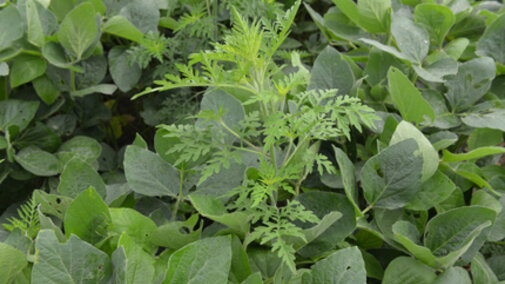Once thought to be an innocent bystander to field crop production, common ragweed can "drastically reduce soybean yields," according to research conducted by University of Nebraska-Lincoln agronomy graduate student Ethann Barnes and other weed scientists at the Eastern Nebraska Research and Extension Center near Mead.
An article published this week on the American Society of Agronomy website described Barnes' 2015-2016 research and the journal article reporting it: Common Ragweed (Ambrosia artemisiifolia L.) Interference with Soybean in Nebraska. The journal article was co-authored by Ethann R. Barnes, Amit J.Jhala, Stevan Z. Knezevic, Peter H. Sikkema, and John L. Lindquist. Barnes, Jhala, Knezevic and Lincquist are in the university's Department of Agronomy and Horticulture and Sikkema is at the University of Guelph-Ridgetown.
Among the findings reported was that one ragweed plant every 1.6 feet of soybean row decreased soybean yield by 76% in 2015, and by 40% in 2016. The yield loss was attributed to competition for light rather than competition for water or other mediating factors.
“The ultimate goal of this area of science is for growers to count the number of weeds or make a measurement in their field three weeks into the season. From there they could see whether it's financially a viable option to control their weeds or just leave them in the field,” Barnes said in the web article. By knowing how much damage the weeds might do, farmers can weigh that loss against the cost of killing the weeds.

